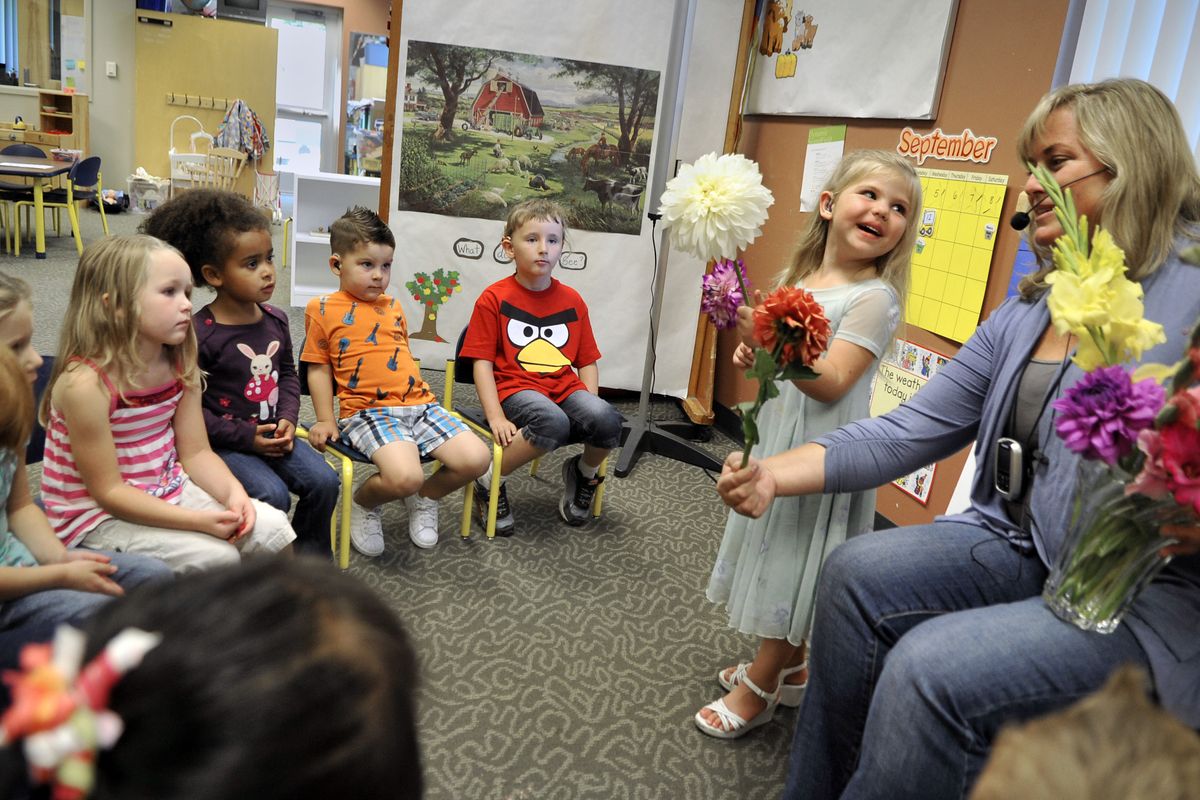HOPE School focuses on auditory development

For local children born with moderate to profound hearing loss, help learning to navigate a noisy world can be found at HOPE School.
Located in the Health and Sciences Building on the Riverpoint Campus, the school has eight students in its morning toddler program and nine in the afternoon preschool. All of HOPE School’s students are 3 to 6 years old and either use hearing aids or have cochlear implants.
Teacher Amy Hardie and speech therapist Megan Babin are passionate about their work and their students. Hardie’s goals are for her students to transition into their neighborhood school, where they can interact with their normal-hearing peers.
“The challenge is to build that auditory brain. Their equipment has to be working every day. If their equipment isn’t working, they’re not getting language and their auditory brain isn’t growing,” she said.
The students receive speech language therapy daily by graduate students from the Eastern Washington University communication disorders department and the Washington State University speech and hearing department, under the supervision of WSU’s speech-language pathology coordinator and clinical supervisor Sandy Bassett.
In her preschool class, Hardie has circle time like many traditional classes, but with some obvious differences. Hardie wears an FM system that amplifies her voice and connects with her students’ equipment. The students focus intently on listening, interaction and vocabulary during activities like show and tell.
“These kids need to hear (things) 50 times more than a normal-hearing kid,” said Kim Schafer, the school’s community outreach coordinator. “The kids may see it but not understand it. Circle time helps them make that connection.”
The real testimonial to the school is in the students.
Six-year-old Chloe Parsons was born deaf. She received cochlear implants when she was 18 months old. Chloe experienced very little communication during her first four years of life. She was removed from her home and adopted. She has been at HOPE School for the past two years.
“We’ve just seen such a huge improvement in the last two years. To see her happy is such a warmth to our hearts,” Schafer said.
Mia Newell, 4, started in the toddler program at HOPE School. Mia was born deaf and received her cochlear implants when she was 16 months old. Unlike some of her classmates, Mia is not shy. She is outgoing and knows exactly what she wants.
Her mom, Dr. Luisita Francis, said, “They teach her to advocate for herself, and they’ve taught her confidence. She’ll talk your ears off.”
Mia is in the preschool program this year, and she’s also attending Woodland Montessori School in Spokane Valley in the mornings. When asked about school, she said, “The other school is a bit louder and the other kids are louder. I can hear everything here (at HOPE). It’s not too loud and it’s not too quiet.” Mia said she loves school, both schools, because it’s fun.
And, frustrations? Francis said they are very minimal, usually when Mia has to repeat herself.
“The only thing that holds her back is that she hates getting things wrong. It has nothing to do with her hearing. She’s a bit of a perfectionist,” Francis said.
HOPE School makes it possible for these children to learn how to listen, speak and hear. The school is privately funded. Parents must pay tuition and often drive long distances. Students come from across the region, from Newman Lake to as far as Davenport.
To help with costs, the school is hosting a fundraiser, Hoedown for HOPE.
“We’re hoping to give the school more outside attention and dollars to keep the school running,” said Francis, who is chairing the event.
The evening will include entertainment by the Ryan Larsen Band, catering by London’s Ultimate Catering and raffles for a week in Maui, including a certificate for plane tickets. Other raffles include a weekend at a condo in Sandpoint and a helicopter ride.